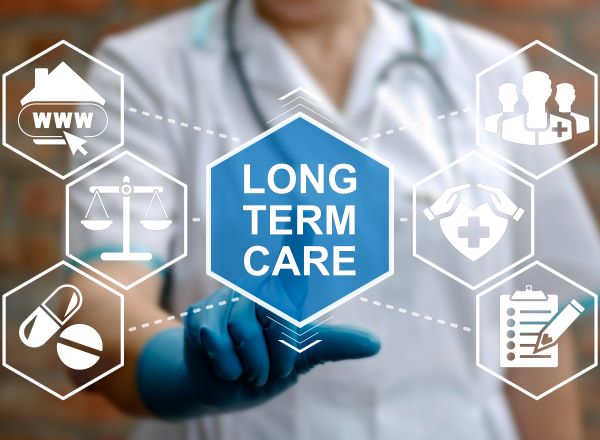On May 11, 2023, the Covid Public Health Emergency (PHE) was formally ended by the…

Connections Between Family and Healthy Aging
Family ties are crucial in the lives of seniors. Family creates a consistent social network and connection that directly impacts the senior’s overall quality of life. Prioritizing family relationships provides continuity as a senior experiences change in their social network. Friends may change, become ill and unavailable, or even pass away, but family is multi-generational and, as such, has an enduring presence for an aging family member. The stability of family relations, even with the ups and downs of disputes, is a familiar source of social and emotional grounding, as well as practical help. A study by the United Health Group reports more than half of older Americans will cite faith or spirituality, and a loving family as the top reasons they have a positive outlook. That positive outlook brings tremendous benefits to a senior’s health and well-being.
Sadly, not all seniors have the benefit of a nuclear family or close extended family. Yet, these connections were deemed more important than financial resources, according to the majority of participants in the United Health Group survey. Aging seniors who integrate into their family system are more prone to live healthier and longer lives than those seniors who remain isolated from family. Even in the case of those seniors living with later stages of dementia, family contact can reduce disease symptoms and may stave off faster mental decline. How is it that family brings about higher rates of longevity?
Family contact helps to maintain a senior’s immune system. Family social connections create optimism, which in turn may lead to stronger cell-mediated immunity, the immune cells that are responsive to bacterial or viral invasions. The senior immune system can also become more adaptive and robust due to low-level exposure to a variety of pathogens when interacting with their family in person. Social seniors, even those in non-family settings, often have stronger immune systems because of human contact.
Other techniques to improve an aging immune system include nutritional supplements or vitamins along with a healthy, nutrient-rich diet. Also, regular exercise, maintaining vaccinations, reducing stress, restful sleep, proper hydration, washing hands, and a positive outlook can all boost a senior’s immune system. When a senior has an actively involved family, many of these health systems are put into play, especially the positive outlook. Having a family who cares about and cares for their elder members reduces feelings of depression, which feeds the cycle of optimism, improving overall health.
A higher level of cognitive functioning is linked to a family connection, as well. Brain health acquires benefits from being happy and socially engaged in activities that challenge memory and thinking skills. Human interaction goes beyond the more repetitive brain teaser challenges and puzzles because the social dynamic is fluid and unpredictable. A senior must engage all of their senses when responding while being in a family group. Holiday meals, birthday celebrations, family reunions, and many other typical family activities are good brainwork for an aging family member. According to a study published in the Public Library of Science, elderly and even middle-aged adults who maintain active social circles appear to be at a lower risk of developing dementia. A family system is the ultimate pre-made social connection. “This finding could feed into strategies to reduce everyone’s risk of developing dementia, adding yet another reason to promote connected communities and find ways to reduce isolation and loneliness,” said the study’s lead author, Andrew Sommerlad, Ph.D., of University College London.
Family roles shift throughout time. Parents who used to care for their children now experience an evolving family structure and the inevitability of their mortal decline. When the roles of parenting reverse, it brings challenges for all involved. Financial support is often needed when a parent is in declining health, and the ability of family members to contribute such help to the senior offers great relief and helps to reduce stress. Even if a family system is unable to provide financial support, emotional support does wonders for the aging process of a family member. Positive conversations and interactions can increase their level of contentment, reduce worry, and bring family inclusiveness and a sense of belonging to the senior.
Not all seniors have a family who can play an active role in their life. However, with extra effort, relationships can be forged that will be mutually beneficial, especially in the digital age of social media. While friendships oftentimes never replace an actual biological family, the adage that “friends are the family you give yourself” rings true and can create lasting and meaningful connections.
All of these connections are really about feeling loved. The benefits of being grounded in love, and what that brings to a person are profound. What if you never felt alone? What if you always felt loved? What if you could live your life knowing that someone was always in your corner, still there for you? The answer is the same to all of these questions – you would have a better chance at living your best life physically, mentally, and emotionally.
Strengthen family connections and friendship relations. Modern technology has made it easier than ever to be a part of someone’s life. Text, email, video chat, and social media platforms provide interaction when it is not possible to physically be with a family member. However, do not overlook the more traditional methods of contact, which include personal visits, a phone call, and a handwritten letter or a card sent via snail mail. While these “old school” methods may not seem relevant to younger generations, they are particularly meaningful to a senior.
Every connection can make a difference. A close family can learn, share, and grow together. Outcomes from these shared experiences benefit all members, but in particular, the older family members. Younger generations are also gaining an invaluable lesson. The digital world is reconfiguring human experiences electronically and is leaving many people wanting human connection. We hope you found this article helpful. If you have questions or would like to discuss a personal legal matter, please contact our office at 732-972-1600.



